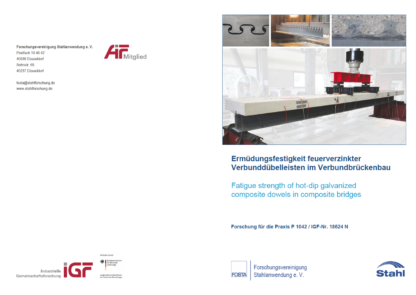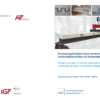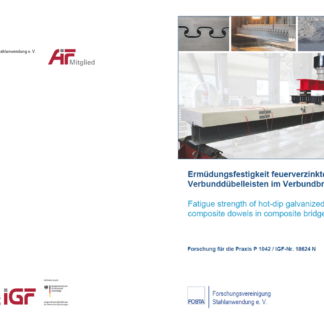Description
P 1042 – Fatigue strength of hot-dip galvanized composite dowels in composite bridges
Investigations in recent years have shown that the hot-dip galvanizing of steel components in bridge constructions provides economic and ecological advantages. It has been showed that the first corrosion protection over the 100-year service life of a bridge can also exist in an environment with high corrosivity, so that no major corrosion protection maintenance measures are required.
At the same time, another innovative solution was developed to increase the efficiency of composite bridges. Based on several research projects and an initial application in 2003, composite dowel strips offer an economical solution for shear connections between steel beams and concrete plates in composite bridge structures. Continuous improvement and further development finally led to a general technical approval applied for by FOSTA and granted by DIBt in Germany. Since then, numerous bridges with this new technology have been built in Germany and abroad. However, hot-dip galvanizing may not be applied to bridges with composite dowel strips, since the effects of hot-dip galvanizing on the fatigue strength of flame-cut composite dowels are unknown. The required fatigue test in accordance with DIN EN 1993-1-9 can therefore not be performed properly at present.
In order to combine the advantages of the composite dowel strip with those of hot-dip galvanizing in bridge construction, the basis for technical regulations was developed within the framework of this project. For this purpose, the galvanizing process with the processtechnical and geometrical influences was examined in regard to possible pre-damages of the composite dowel strip. One result was that the resulting plastic strains in the most unfavourable configuration of geometry and galvanizing process (max. 0.5%) were below the limit value of 2% for the requirements of detail class A specified in DASt-Richtlinie 022, Annex 4. Furthermore, the influence of hot-dip galvanizing on the fatigue strength of the composite dowel strip was investigated by cyclic tests. Comparative fatigue tests were carried out on galvanized and non-galvanized small scale specimens, push-out samples and on beams similar to building components.
The tests consistently showed that, as regulated in the general type approval for the nongalvanized composite dowel strips, the fatigue strength of the hot-dip galvanized version can also be verified with detail category 125 according to DIN EN 1993-1-9. Thus, the research objectives have been achieved and a practicable basis for the design in practice has been provided.
Main content only available in german language.
Published in:
May 2020
Authors:
Prof. Dr.-Ing. M. Feldman, R. Kühne, M.Sc., Prof. Dr.-Ing. D. Ungermann, S. Holtkamp, M.Sc.




